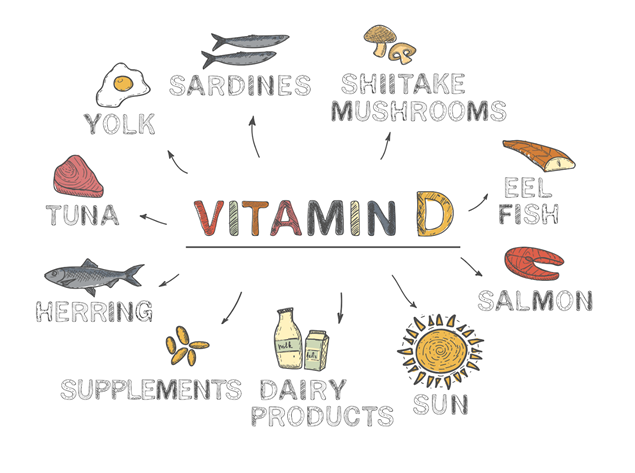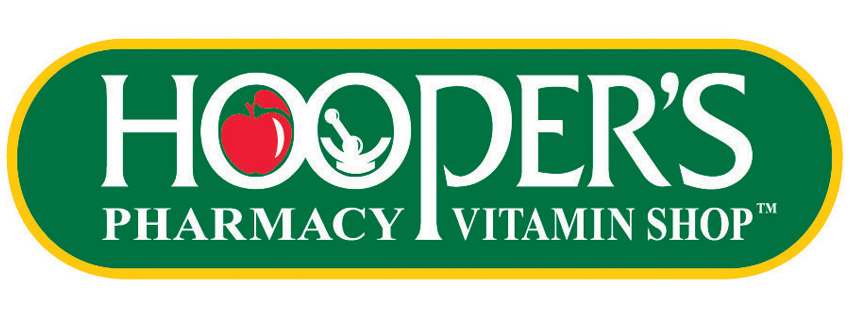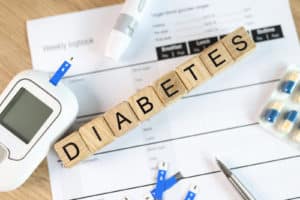Vitamin D gets a lot of attention these days, for its role in supporting overall health, bone density, and immunity – and especially now, when protecting our health has become more important than ever.
Vitamin D Basics
Vitamin D is one of 13 Vitamins and is classified as fat-soluble along with vitamins A, E, and K. Vitamin D is made up of a group of steroids that is both a micronutrient we eat and a hormone our bodies make – and plays a vital role in our health.
For human health, the most important forms are vitamin D3 (cholecalciferol) and vitamin D2 (ergocalciferol or “pre-vitamin D).
Benefits
Supplementation of vitamin D is associated with a wide range of benefits, and can help with:
- Building and maintaining strong bones and teeth;
- The absorption and use of calcium and phosphorus;
- Maintaining and supporting immune function; and
- Supporting biological functions that play a key role in our overall health.
Vitamin D helps the body absorb critical nutrients such as calcium, iron, magnesium, phosphorus, and zinc in the intestine during digestion, aiding mineral uptake by bones. It has also been linked to a reduced risk of osteoporosis [1], especially among women who are more susceptible.
D receptors are found on various immune cells and the nutrient has been found to help modulate both the innate and adaptive immune responses, which help your body defend against disease-causing viruses and microorganisms. People with increased autoimmune issues and increased susceptibility to infection have also been associated with deficiency. [2]
Receptors can be found throughout the body’s organs and tissues which suggests it may play a role in other health conditions that researchers are investigating.
Sources

There are three ways for the body to get vitamin D: sun exposure, diet, and supplementation.
This vitamin is nicknamed “the sunshine vitamin” because when human skin is exposed to sunlight (ultraviolet light – UVB) a certain compound (7-dehydrocholesterol) is converted into vitamin D3 in the skin. But there are many factors that can influence how much your body makes:
- smog
- season
- time of day
- cloud cover
- sunscreen use
- limited outdoor time
- amount of skin exposed to sunlight
- age (ability to generate decreases with age)
- colour of skin (darker skin absorbs fewer UV rays)
Another factor is geography. In Canada, from October to April the sun’s rays aren’t strong enough to generate adequate amounts naturally.
As for food, there aren’t many natural sources of this vitamin. Fatty fish (salmon, trout, mackerel), sun-exposed mushrooms, beef liver, and egg yolks contain this vitamin, but aren’t eaten in high enough quantities to make them an adequate source. Some foods are fortified including milk, margarine, plant-based beverages, orange juice, and some yogurts and cheese (often made with fortified milk).
While it can be difficult to get enough naturally, there is a wide range of supplements available in tablets, capsules, and liquid formulas. These simple additions to your everyday routine can help ensure you’re getting enough of this essential nutrient.
Health Canada outlines the recommended daily intake of vitamin D as follows [3]:
| Age Group | Recommended Dietary Allowance (RDA) per Day |
| Infants 0-6 months | 400 IU (10 mcg)* |
| Infants 7-12 months | 400 IU (10 mcg) * |
| Children 1-3 years | 600 IU (15 mcg) |
| Children 4-8 years | 600 IU (15 mcg) |
| Children and Adults 9-70 years | 600 IU (15 mcg) |
| Adults > 70 years | 800 IU (20 mcg) |
| During Pregnancy & Lactation | 600 IU (15 mcg) |
* Adequate Intake rather than Recommended Dietary Allowance.
[Source – Health Canada]3 Things to Consider When Supplementing
- D3 is fat-soluble, so it works best when taken with food, after meals or with other fats or oils – like omega-3 fish oils.
- D3 comes from animal sources and is the form produced in the human body while D2 comes from plant sources. While both provide the body with Vitamin D, studies have compared supplementation and found that vitamin D3 tended to raise and sustain blood levels more than D2. [4]
- Too much vitamin D is rare and can only happen through supplementation (the body will regulate its production through sun exposure). Elevated levels over time can result in too much calcium in the blood which can cause uncomfortable symptoms or more serious issues. For this reason, it is best to adhere to Health Canada guidelines for dosages and to discuss with your health care practitioner.
Hooper’s Pharmacy & Vitamin Shop can help find the best vitamin D for you and your family that suits your dosage requirements and lifestyle.
What About Vitamin D for COVID-19?
COVID-19 has heightened the interest of vitamin D’s role in immune function – especially in regard to its connection with modulating the immune response.
One preliminary study [5] examined the connection between mortality rates from the virus in countries with lower vitamin D levels, finding them to be higher than countries less affected – but much more research is needed in this area. Currently, there are no treatments or cures for COVID-19 and you should be mindful and aware of misinformation and false claims spread online. Make sure to consult your healthcare practitioner before adding vitamin D to your health regimen.
However, due to its role in the body’s many functions and its benefits in supporting healthy immunity, vitamin D is still an important nutrient to overall health and our general resiliency against sickness.
As more studies emerge and scientists learn more about COVID-19, there will be greater clarity regarding various nutrients’ roles in prevention and recovery.
Learn more about our popular brand vitamins and supplements, and local Pharmacy directions.
References
- Bischoff-Ferrari HA, et .al. (2009) Prevention of nonvertebral fractures with oral vitamin D and dose dependency: a meta-analysis of randomized controlled trials. Archives of internal medicine. 2009 Mar 23;169(6):551-61. Retrieved from: https://jamanetwork.com/journals/jamainternalmedicine/article-abstract/414883
- Aranow, Cynthia (2011). Vitamin D and the Immune System. J Investig Med. 2011 Aug;59(6):881-6. Retrieved from: https://pubmed.ncbi.nlm.nih.gov/21527855/
- Vitamin D and Calcium: Updated Dietary Reference Intakes. Health Canada – Nutrition and Healthy Eating Vitamins and Minerals – Nutrition and Healthy Eating https://www.canada.ca/en/health-canada/services/food-nutrition/healthy-eating/vitamins-minerals/vitamin-calcium-updated-dietary-reference-intakes-nutrition.html
- Vitamin D. Harvard T.H. Chan School of School of Public Health. Updated March 2020 Retrieved from: https://www.hsph.harvard.edu/nutritionsource/vitamin-d/
- Daneshkhah, Ali et. al. Department of Biomedical Engineering, Northwestern University. Boston Medical Center. (2020). Retrieved from: https://www.medrxiv.org/content/10.1101/2020.04.08.20058578v3.full.pdf
Article used with permission from Healthier by Nature, from the experts at the Canadian Health Food Association.
Book, Michelle W. Do You Need Vitamin D? Healthier by Nature. Retrieved from: https://www.healthierbynature.ca/fundamentals/complete-guide-on-vitamin-d/




